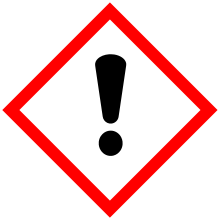Caffeine (data page)
This page provides supplementary chemical data on caffeine.
| |||
| Names | |||
|---|---|---|---|
| IUPAC names
1,3,7-trimethyl-1H-purine-2,6(3H,7H)-dione 3,7-dihydro-1,3,7-trimethyl-1H-purine-2,6-dione | |||
| Identifiers | |||
3D model (JSmol) |
|||
| 17705 | |||
| ChEBI | |||
| ChEMBL | |||
| ChemSpider | |||
| DrugBank | |||
| EC Number |
| ||
| 103040 | |||
| KEGG | |||
PubChem CID |
|||
| RTECS number |
| ||
| UNII | |||
| |||
| |||
| Properties | |||
| C8H10N4O2 | |||
| Molar mass | 194.194 g·mol−1 | ||
| Appearance | Odorless, white needles or powder | ||
| Density | 1.23 g/cm3, solid[1] | ||
| Melting point | 227 to 228 °C (441 to 442 °F; 500 to 501 K) (anhydrous) 234 to 235 °C (453 to 455 °F; 507 to 508 K) (monohydrate) | ||
| Boiling point | 178 °C (352 °F; 451 K) (sublimation) | ||
| 2.17 g/100 mL (25 °C) 18.0 g/100 mL (80 °C) 67.0 g/100 mL (100 °C) | |||
| Acidity (pKa) | −0.13–1.22[2] | ||
| 3.64 D (calculated) | |||
| Hazards | |||
| Safety data sheet | ICSC 0405 | ||
| GHS pictograms |  | ||
| GHS Signal word | Warning | ||
GHS hazard statements |
H302 | ||
| P264, P270, P301+312, P330, P501 | |||
| NFPA 704 (fire diamond) | |||
| Lethal dose or concentration (LD, LC): | |||
LD50 (median dose) |
192 mg/kg (rat, oral)[3] | ||
Except where otherwise noted, data are given for materials in their standard state (at 25 °C [77 °F], 100 kPa). | |||
| Infobox references | |||
References
- Caffeine, International Occupational Safety and Health Information Centre (CIS)
- This is the pKa for protonated caffeine, given as a range of values included in Harry G. Brittain, Richard J. Prankerd (2007). Profiles of Drug Substances, Excipients and Related Methodology, volume 33: Critical Compilation of pKa Values for Pharmaceutical Substances. Academic Press. ISBN 978-0-12-260833-9.
- Peters, Josef M. (1967). "Factors Affecting Caffeine Toxicity: A Review of the Literature". The Journal of Clinical Pharmacology and the Journal of New Drugs. 7 (3): 131–141. doi:10.1002/j.1552-4604.1967.tb00034.x. Archived from the original on 2008-06-10. Retrieved 2011-09-25.
This article is issued from Wikipedia. The text is licensed under Creative Commons - Attribution - Sharealike. Additional terms may apply for the media files.


